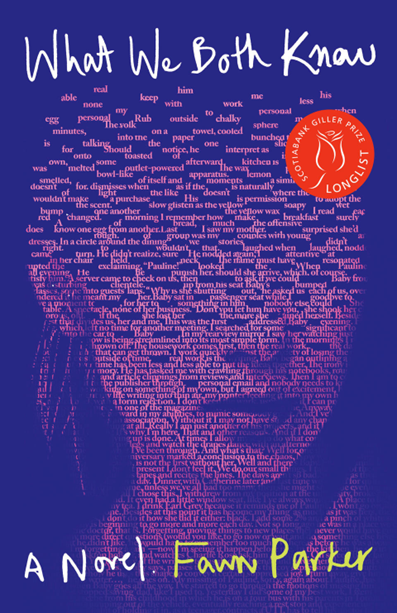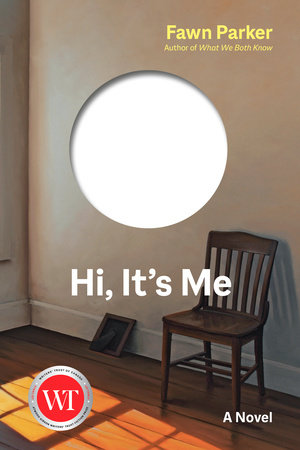Fawn Parker is a celebrated author and distinguished graduate of the English Department’s MA program in English in the Field of Creative Writing.
Fawn’s books include the novels What We Both Know, longlisted for the 2022 Giller Prize, Set-Point, and Dumb-Show, as well as the poetry collection Soft Inheritance, which won both the Fiddlehead Poetry Book Prize and the J. M. Abraham Atlantic Poetry Award. Her short story “Feed Machine” was longlisted for the 2020 Writers’ Trust McClelland & Stewart Journey Prize, and her story “WunderHorse II” was anthologized in After Realism, edited by André Forget.
Currently, Fawn is pursuing her PhD at the University of New Brunswick, where she continues to explore and expand her literary craft. She divides her time between Toronto and Fredericton, where she is serving as Fredericton’s Poet Laureate.
In this interview, we asked Fawn about her journey, her inspirations, and her insights into the writing process.

What initially drew you to creative writing, and how did you decide to pursue it at the graduate level?
I started writing at a young age and, looking back, I think it was a way for me to find some freedom and privacy in my family home. I wasn't a strong student in school, so I didn't plan to continue on to university until I learned that Concordia in Montreal offered a Creative Writing degree. That seemed really exciting to me. I was in college studying to become an American Sign Language interpreter and writing in my spare time, starting to send out my work to journals. Getting into the BA program really encouraged me to keep working at it, and by the time I graduated I had a lot more confidence. The MA made sense as a next step, though it made me nervous. I think I carried with me this imposter identity that maybe most of us have to some degree.
What was one valuable thing that you gained from your MA program in English in the Field of Creative Writing at the University of Toronto?
U of T takes itself seriously, and when I arrived on campus I noticed a sense of pride among students, which I hadn't encountered before. It was an adjustment I had to make inside of myself, this idea that we were there because we wanted to be, and because literature was important. I learned to respect my work and work in general, instead of sitting through classes thinking about something else, waiting for them to be over. I always really engaged with workshops, especially in fiction, but the undergraduate academic classes felt like torture to me before my MA. I think a big part of it was I didn't believe I had anything of value to add. The MA classroom is so much smaller, and structured around conversation, so I was forced to find my voice, and gained confidence that way.
 How has your writing evolved since completing your MA?
How has your writing evolved since completing your MA?
My writing is constantly changing. I don't like two projects to ever feel too similar. When I look back, I can see the evolution of my work, but in the moment when I'm writing a new piece, it always feels like I'm in totally foreign territory. That's how I keep it exciting for myself. I worked with [Professor and Acting Chair] Bob McGill on my thesis project (which later became my novel Hi, It's Me) and his editorial feedback affected my process, I feel. I'm more diligent now in the early stages, and think more about what a reader does and doesn't know, what's actually on the page, before I get carried away by a story.
Do you have any specific rituals or habits that help you write?
To write well—and by “well” I mean with focus, and for longer than a few minutes—I have to start first thing in the morning and work toward a specific goal. Often that's 1500 words of new material or one chapter of edits. Without something concrete I get lost and never feel satisfied. Like running without a timer: I never trust I've hit the mark. I like to wake up early, around 5am, have a coffee and write. It happens really naturally that way and I feel like I'm still inside of my ideas, the way dreams sort of just flow. If I have to work later in the day, I really have to push. I can get into it, but it's hard, and a bit of a gamble. Sometimes nothing comes at all.
How do you decide when a piece of writing is ready to be shared with the world?
I think I'm pretty bad about this. I don't edit much until I have to (i.e., with my editor). So for me, once I've written something through from beginning to end, worked out anything that doesn't make any sense at all, I get sort of restless and want it out of my hands. I've tried to change this because when I've told other writers they've seemed to take offence, or they’ve suggested that I don't care about the quality of my work. Maybe I will become the kind of writer who spends hours reworking a single sentence? I don't know. For me, the energy in a text comes directly from the writing process. I think you can feel when a person is writing with enthusiasm. So maybe I am a bit precious about maintaining that excitement. A grammatical mistake, a little consistency error here and there: I guess that's not what it's about for me.
What advice would you give to writers considering an MA program with a Creative Writing focus?
I would recommend thinking about the values intrinsic to a degree program and ensuring that those at least somewhat align with your own, specifically in art and creativity. The creative writing MA is to some extent built on the notion that writing can be taught and/or improved through direct feedback and discussion. I think for some people that can be discouraging or restrictive or they simply don't agree, which is fine. There are many ways to approach writing and I don't think a degree program is capable of covering every one of them. So I think it is up to the student to consider whether their creative practice will benefit from the structure and community on campus. I feel fortunate because although I did struggle with the idea of "learning" how to write in a classroom setting, I was able to sort of switch modes and protect my private creative practice when I felt I needed to. That allowed me to really grow as an academic without losing my sense of freedom when I was alone at my desk, writing.


